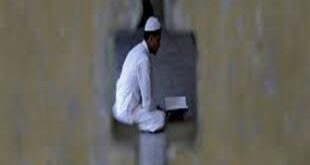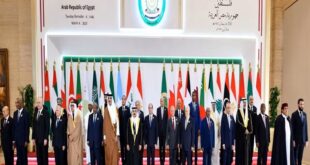
After the New Year’s Eve attacks on police and rescue workers in several German cities, the political debate about the causes of the violence and Germany’s integration policy continues to gain momentum. In Berlin, 145 people, most of whom were under the age of 25, were arrested by police in connection with the riots.
Nach den verheerenden Ausschreitungen in der #Silvesternacht berichten Berliner #Feuerwehr|leute, wie sie die Situation erlebt haben – und was sie sich wünschen. pic.twitter.com/74qGivxBsv
— rbb Abendschau (@rbbabendschau) January 3, 2023
Flying bottles and firecrackers, injured first responders and videos of violence — the New Year’s Eve riots in Berlin and other cities across Germany has prompted a heated debate not only about a possible ban on fireworks, but also the root causes of the riots, Germany’s allegedly failed integration policy, racist stereotypes and punishments of the rioters.
« We have a big problem in major German cities with certain young men with an immigrant background who despise our state, commit acts of violence and are hardly reached by education and integration programs, » federal Interior Minister Nancy Faeser told the Funke Mediengruppe (Funke media group) on Wednesday (January 4),
Young perpetrators would have to face swift and clear consequences under criminal law, the politician said. However, Faeser warned against stirring up racist resentment, saying « those who exploit the necessary debate in order to exclude do not solve the problem, but intensify it. »
Wir müssen gewaltbereiten Integrationsverweigerern in unseren Städten die Grenzen aufzeigen: mit harter Hand und klarer Sprache. Aber ohne rassistische Ressentiments zu schüren. Wer die notwendige Debatte ausnutzt, um auszugrenzen, löst das Problem nicht, sondern verstärkt es.
— Nancy Faeser (@NancyFaeser) January 4, 2023
Instead of using the attacks on police and firefighters as a reason for an integration debate, the federal government’s integration and anti-racism commissioner believes the focus should be on young men as perpetrators. « What we need is an honest debate about youth violence, » Reem Alabali-Radovan told the dpa news agency on Wednesday. After all, she said, it is « mainly about young men who experience violence in a group. »
« We must judge perpetrators by their actions, not by their presumed origins, as some are now doing, » Alabali-Radovan added.
What happened on New Year’s Eve?
In the night of New Year’s Day, police officers and firefighters on duty in several cities were attacked, including with fireworks. In Germany’s most populous state North Rhine-Westphalia, some 250 mostly young people were temporarily detained, around half of them German citizens.
In Berlin, 41 police officers on duty were reportedly injured. According to a spokesman for the authorities, one policeman who suffered severe burns has since been released from hospital. 145 people were arrested by the police in connection with the riots in the German capital.
According to a police report, the alleged perpetrators in Berlin were almost all male and of 18 different nationalities. 45 of the suspects were German citizens, followed by 27 Afghan nationals and 21 Syrians. All suspects have since been released.
Moreover, about two-thirds of the 145 arrested are under 25 years old, according to police. Of those, 27 suspects are still minors, police said Wednesday (January 4).
Andreas Zick, head of the Institute for Interdisciplinary Research on Conflict and Violence at Bielefeld University, warned against blaming people with a migration background. « The fact that New Year’s Eve was so violent is part of an increase in violence throughout society, » he told Redaktionsnetzwerk Deutschland (RND).
‘Society-wide’ problem
Echoing Zick’s comments, political scientist Hans Vorländer said repeated outbreaks of violence including attacks on police or firefighters was « a problem of violence in society as a whole, » he told news agency dpa.
According to Vorländer, who is a member of the German Council of Experts on Integration and Migration (SVR), this problem exists not only in neighborhoods with a high proportion of people with a migration background, but has also occurred, for example, around the COVID-19 demonstrations, at right-wing extremist marches and in the violent soccer fan scene.
Problems arise above all, Vorländer added, with young men and in a certain environment, where « there are problems of accommodation, where the level of education is low » and a « widespread street culture of showing off, where the desire for recognition, even through acts of violence, is prevalent. »
Ulrich Wagner, a social psychologist, said that alcohol often plays a role, as well as a mood between cheerfulness and aggression, which then turns as a mixture of « attack and joke » against the rescue forces. At the same time, Wagner pointed to an overall downward trend in violence. However, he added that specific forms of violence — such as those directed at emergency personnel at the recent turn of the year — are on the rise.
Psychologist and migration expert Ahmad Mansour said the topic is also about youth culture. The suspects were people who wanted to understand and live out their masculinity in such a way that they were also prepared to use violence, he told tagesschau24. « It was pure lust for violence, » Mansour said, « but it also has to do with patriarchal structures that lead to these people perceiving our rule of law, our police, our rescue forces as something weak that is allowed to be attacked. »
Psychologe und Migrationsexperte Ahmad Mansour betrachtet eine Lösung zur Reduzierung der Gewalt in der Arbeit mit Eltern. Und er beklagt, dass Moscheen nicht die Werte der Gesellschaft ermitteln. (T+) https://t.co/0JXjKXvKso
— Tagesspiegel (@Tagesspiegel) January 4, 2023
Mansour further said that many mosques were part of the problem. « Of course, these riots on New Year’s Eve have nothing to do with Islam, » he told news outlet Tagesspiegel. However, many mosque associations repeatedly conveyed values « that contradict our fundamental values. »
« If I keep making parents afraid of equality and freedom of opinion and reject the values of this society, then I cannot credibly say the day after tomorrow that they should raise their children without violence, » he said.
What did emergency forces say?
Some responders also joined the debate in the wake of the New Year’s Eve riots. A Twitter user named Martin who says he’s a member of his local voluntary fire brigade, lamented an « increasing aggressiveness, impatience and incomprehension » during operations when people feel restricted by first responders.
« People’s aggression has increased since the #AfD has been dumping their filth all over the media and no, it’s not just migrants and foreigners, » he said, referring to Germany’s far-right Alternative for Germany party. « The aggression/impatience comes from all sectors of society, » he tweeted, adding that « in this respect, we do not have a specific problem with people of a certain origin (apart from hot spots), but a problem for society as a whole. »
Wir haben diesbezüglich (von Brennpunkten abgesehen) kein spezifisches Problem mit Menschen bestimmter Herkunft, sondern ein gesamtgesellschaftliches Problem /End
— Martin (@ybessal) January 2, 2023
Baris Coban, a fireman on the scene in Berlin on New Year’s Eve described how he and his colleagues were being attacked with stones, bottles and firecrackers by « young adults, » most of whom supposedly had a migration background. « I’m saying that despite having a migration background myself, » he told RBB24. « I’ve been fighting prejudices all my life. » Coban further said he and his colleagues had to stop extinguishing a burning coach and leave the scene to protect themselves.
Nach den verheerenden Ausschreitungen in der #Silvesternacht berichten Berliner #Feuerwehr|leute, wie sie die Situation erlebt haben – und was sie sich wünschen. pic.twitter.com/74qGivxBsv
— rbb Abendschau (@rbbabendschau) January 3, 2023
Conservative politicians criticized for comments
Friedrich Merz, leader of the conservative Union party, told the Münchner Merkur newspaper, « The chaotic people, many of them with « migration backgrounds, » are challenging the state they despise with their rampage. »
Markus Söder, Prime Minister of the state of Bavaria, said that « Berlin is unfortunately developing into a chaos city — starting with politics, which can neither organize elections nor guarantee the safety of its citizens, » referring to last year’s flawed election that led to a re-election planned for February 12.
It was « of course without question that emergency forces must never, with any justification, in any situation be attacked, hindered in their mission, » Foreign Minister Annalena Baerbock said on the sidelines of her visit to Lisbon.
The legal policy spokesman for the Greens in the Bundestag, Helge Limburg, condemned the riots. He told the Tagesspiegel that the attempt by some conservative politicians to locate the problems primarily in Berlin was obviously an election campaign maneuver. Racist resentment was being served instead of solutions being presented, Limburg said.
Canan Bayram, a member of Parliament for the Green Party, complained that the discussion about the attacks on New Year’s Eve was serving « racist stereotypes ».
Wenn ein MdB der #CDU nicht in der Lage ist, über Herausforderungen zu reden, ohne rassistische Stereotype zu bedienen, müssen wir wohl endlich über Integrationskurse für Menschen reden, denen die Integration in die Einwanderungsgesellschaft in #Deutschland nicht gelingen will pic.twitter.com/xltqYf21tW
— Canan Bayram (@LieblingXhain) January 3, 2023
Jens Spahn, deputy parliamentary group leader of the center-right Christian Democratic Union party, blamed a failed integration policy in part for the escalation. « This is more about unregulated migration, failed integration and a lack of respect for the state rather than fireworks, » Spahn told the portal t-online.
‘Strong state,’ education, parents and mosques as levers
Political scientist Vorländer said counteracting outbreaks of violence like the one on New Year’s Eve didn’t require special projects but « strengthening the regular systems of school, work, housing » as well as law enforcement and justice.
« To stop the violence, » Germany’s commissioner for integration and anti-racism Reem Alabali-Radovan said on Twitter, « we need not only a strong state that shows a presence on the streets and sanctions crimes quickly and severely, but also an interlocking of social work and prevention in schools, as well as the police and the courts. »
Um die Gewalt zu stoppen, brauchen wir neben einem starken Staat, der Präsenz auf der Straße zeigt und Straftaten schnell und hart sanktioniert, auch ein Ineinandergreifen von Sozialarbeit und Prävention an Schulen, aber auch von Polizei und Gerichten. 3/4
— Reem Alabali-Radovan (@ReemAlabali) January 4, 2023
Psychologist and migration expert Ahmad Mansour considers a solution to reducing violence to be working with parents. « Violence is not questioned at all as an educational method; they think that they can educate their children with violence. That’s why we have to have dialogues with the parents. »
Finally, Mansour and other psychologists said the onus is also on mosques, especially when it comes to promoting integration work.

World Opinions – Info Migrants With dpa, tagesschau.de, KNA




 World Opinions Débats De Société, Questions, Opinions et Tribunes.. La Voix Des Sans-Voix | Alternative Média
World Opinions Débats De Société, Questions, Opinions et Tribunes.. La Voix Des Sans-Voix | Alternative Média




